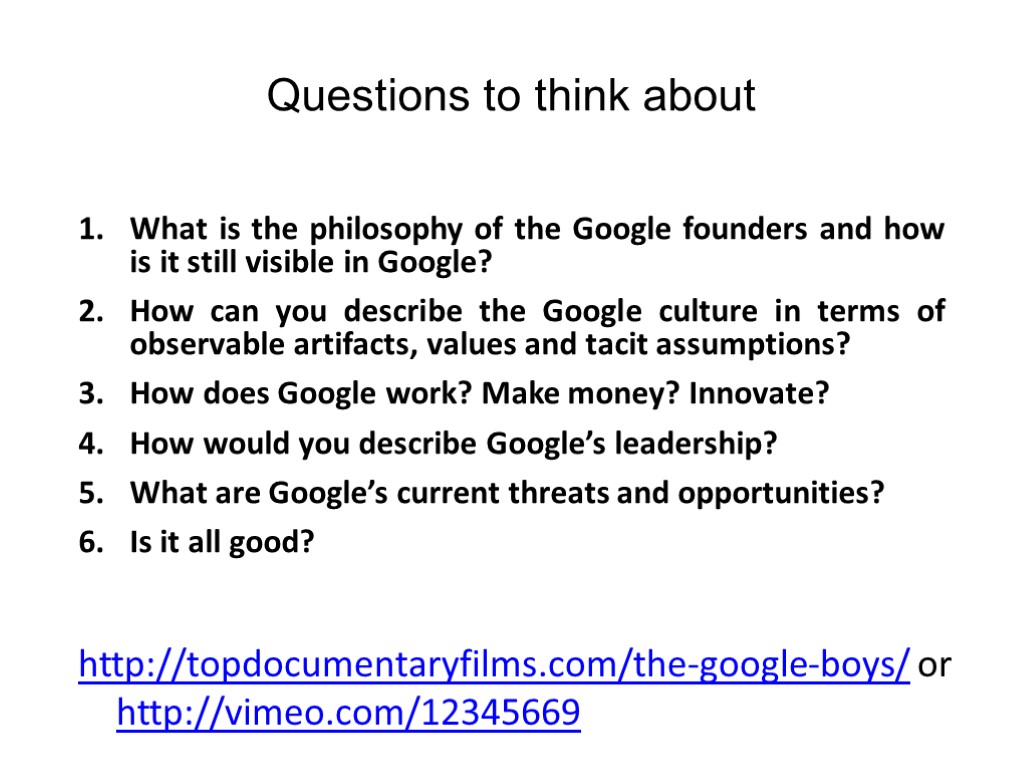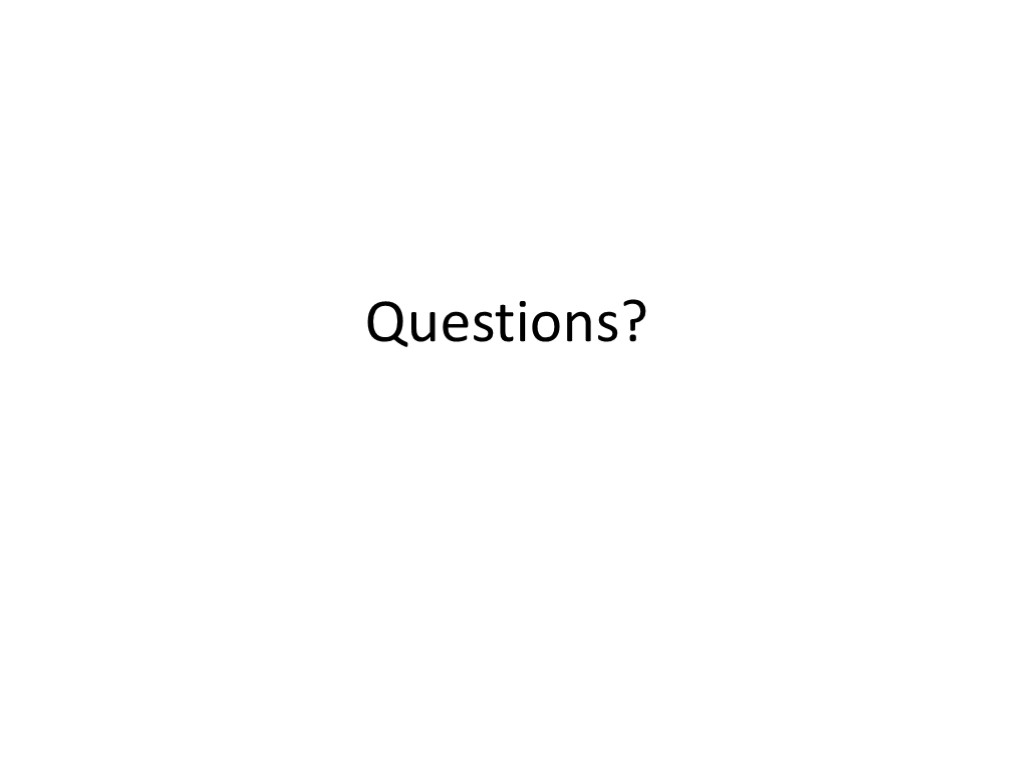HUMAN RESOURCE MANAGEMENT(Societal) Culture Culture = “the collective



























![Ten things [that relate to the founders] that Google employees say they know to Ten things [that relate to the founders] that Google employees say they know to](https://present5.com/customparser/-44689923_295524235 --- hrm_organisational_culture.ppt/slide_27.jpg)



hrm_organisational_culture.ppt
- Количество слайдов: 30
 HUMAN RESOURCE MANAGEMENT
HUMAN RESOURCE MANAGEMENT
 (Societal) Culture Culture = “the collective programming of the mind, which distinguishes the members of one category of people from another” (Hofstede, 1994, p. 1)
(Societal) Culture Culture = “the collective programming of the mind, which distinguishes the members of one category of people from another” (Hofstede, 1994, p. 1)
 Why care? Over the last decades we became aware that much management theory and research stems from the USA – is it also valid elsewhere? ‘Global business makes sense, but it is much more difficult to do it than to talk about it. The American manager prides him- or herself on directness, frankness, being-in-your-face, being accountable. But that’s almost unique in the world…’ Alfred Zeien, former CEO of Gillette
Why care? Over the last decades we became aware that much management theory and research stems from the USA – is it also valid elsewhere? ‘Global business makes sense, but it is much more difficult to do it than to talk about it. The American manager prides him- or herself on directness, frankness, being-in-your-face, being accountable. But that’s almost unique in the world…’ Alfred Zeien, former CEO of Gillette
 What is organisational culture?
What is organisational culture?

 Organisational Culture The set of key values, assumptions, understandings, and ways of thinking that is shared by members of an organisation and taught to new members.
Organisational Culture The set of key values, assumptions, understandings, and ways of thinking that is shared by members of an organisation and taught to new members.
 Organisational Culture Culture can now be defined as (Schein, 1985): a pattern of basic assumptions, invented, discovered, or developed by a given group, as it learns to cope with its problems of external adaptation and internal integration, that has worked well enough to be considered valid and, therefore is to be taught to new members as the correct way to perceive, think, and feel in relation to those problems.
Organisational Culture Culture can now be defined as (Schein, 1985): a pattern of basic assumptions, invented, discovered, or developed by a given group, as it learns to cope with its problems of external adaptation and internal integration, that has worked well enough to be considered valid and, therefore is to be taught to new members as the correct way to perceive, think, and feel in relation to those problems.

 3 Fundamental Levels at which culture manifests itself observable artifacts values basic underlying assumptions Artifacts = what people can hear, feel or see (visible organizational structures and processes) - easy to notice, difficult to read Espoused Values = inspire and even determine behaviour (to a certain extent); not as easy to notice as behavioural manifestations, but reflected in the norms of conduct Assumptions = most often unnoticed, represent the essence of organizational culture, therefore its most profound layer (the strongest and most profound values).
3 Fundamental Levels at which culture manifests itself observable artifacts values basic underlying assumptions Artifacts = what people can hear, feel or see (visible organizational structures and processes) - easy to notice, difficult to read Espoused Values = inspire and even determine behaviour (to a certain extent); not as easy to notice as behavioural manifestations, but reflected in the norms of conduct Assumptions = most often unnoticed, represent the essence of organizational culture, therefore its most profound layer (the strongest and most profound values).
 Perhaps you’ve seen this model
Perhaps you’ve seen this model
 The organization's relationship to its environment The nature of human activity The nature of reality and truth The nature of time The nature of human nature The nature of human relationships Homogeneity vs. Diversity (Schein, 1985) Metaphors and symbols Stories and myths Ceremonies and rituals Norms and rules of the games The organization’s philosophy (attitudes and beliefs) Declared and undeclared values Most profound convictions Dimensions of org culture OR
The organization's relationship to its environment The nature of human activity The nature of reality and truth The nature of time The nature of human nature The nature of human relationships Homogeneity vs. Diversity (Schein, 1985) Metaphors and symbols Stories and myths Ceremonies and rituals Norms and rules of the games The organization’s philosophy (attitudes and beliefs) Declared and undeclared values Most profound convictions Dimensions of org culture OR
 What do cultures do?
What do cultures do?
 Do organisations have uniform cultures? Dominant culture Expresses the core values that are shared by a majority of the organisation’s members Subcultures Minicultures within an organisation, typically defined by department designations and geographical separation. Any definable group with a shared history can have a culture different subcultures in one organization If the organization as a whole has had shared experiences total organizational culture
Do organisations have uniform cultures? Dominant culture Expresses the core values that are shared by a majority of the organisation’s members Subcultures Minicultures within an organisation, typically defined by department designations and geographical separation. Any definable group with a shared history can have a culture different subcultures in one organization If the organization as a whole has had shared experiences total organizational culture
 How is a culture created and preserved? Creating a culture Norm formation around critical indicents Role of the founder and leaders Preservation of culture Socialization
How is a culture created and preserved? Creating a culture Norm formation around critical indicents Role of the founder and leaders Preservation of culture Socialization
 Culture creation
Culture creation
 The roles of the founding leaders Founders hire and keep only the employees who think and feel the same way they do (attraction-selection-attrition) Founders indoctrinate and socialize these employees to their way of thinking and feeling The founders’ own behaviour acts as a role model that encourages employees to identify with them, and thereby internalize their beliefs, values, and assumptions
The roles of the founding leaders Founders hire and keep only the employees who think and feel the same way they do (attraction-selection-attrition) Founders indoctrinate and socialize these employees to their way of thinking and feeling The founders’ own behaviour acts as a role model that encourages employees to identify with them, and thereby internalize their beliefs, values, and assumptions
 The roles of strategic leaders Making strategic decisions Creating and communicating a vision of the future Developing key competencies and capabilities Developing organisational structures, processes, and controls Managing multiple constituencies Selecting and developing the next generation of leaders Sustaining an effective organisational culture Infusing ethical value systems into an organisation’s culture
The roles of strategic leaders Making strategic decisions Creating and communicating a vision of the future Developing key competencies and capabilities Developing organisational structures, processes, and controls Managing multiple constituencies Selecting and developing the next generation of leaders Sustaining an effective organisational culture Infusing ethical value systems into an organisation’s culture
 HOW TO MEASURE/ ASSESS AN ORG CULTURE? ? How would you do it?
HOW TO MEASURE/ ASSESS AN ORG CULTURE? ? How would you do it?
 Observe the physical surrounding (e.g. signs, pictures, dress code, office furnishing). What do these seem to symbolize or reflect? Who did you meet with? How would you characterize the style of the people you meet (e.g. formal, casual, serious, jovial)? Does the organisation have formal rules written down somewhere? What is the background of the company’s founder? What is the background of the current senior managers? Were they promoted from within or hired from outside? ?
Observe the physical surrounding (e.g. signs, pictures, dress code, office furnishing). What do these seem to symbolize or reflect? Who did you meet with? How would you characterize the style of the people you meet (e.g. formal, casual, serious, jovial)? Does the organisation have formal rules written down somewhere? What is the background of the company’s founder? What is the background of the current senior managers? Were they promoted from within or hired from outside? ?
 How does the organisation integrate new employees (e.g. orientation programs, trainings)? How does the boss define job success (e.g. only task performance and profit, meeting deadlines, proactively helping out)? Which decisions were well received and which decisions didn’t work out well? What were their consequences for the decision makers? ?
How does the organisation integrate new employees (e.g. orientation programs, trainings)? How does the boss define job success (e.g. only task performance and profit, meeting deadlines, proactively helping out)? Which decisions were well received and which decisions didn’t work out well? What were their consequences for the decision makers? ?

 Effective cultures? Culture strength Strong culture [a culture in which the core values are intensely held and widely shared] = strong performance 2. High consistency [the level of cohesion, integration, or agreement around values and norms] A shared set of corporate values A high level of agreement
Effective cultures? Culture strength Strong culture [a culture in which the core values are intensely held and widely shared] = strong performance 2. High consistency [the level of cohesion, integration, or agreement around values and norms] A shared set of corporate values A high level of agreement
 Kotrba et al (2012) - Culture traits: Involvement Consistency Adaptability Mission The effects of cultural consistency are conditional, with the other culture traits determining the magnitude and direction of consistency’s effects. Culture consistency
Kotrba et al (2012) - Culture traits: Involvement Consistency Adaptability Mission The effects of cultural consistency are conditional, with the other culture traits determining the magnitude and direction of consistency’s effects. Culture consistency
 The difference between culture and climate Culture researchers argue for the importance of a deep understanding of underlying assumptions, individual meaning, and the insider's point of view of the organization. Climate researchers place greater emphasis on organizational members' perceptions of "observable" practices and procedures that are closer to the "surface" of organizational life Climate for quality Climate for innovation
The difference between culture and climate Culture researchers argue for the importance of a deep understanding of underlying assumptions, individual meaning, and the insider's point of view of the organization. Climate researchers place greater emphasis on organizational members' perceptions of "observable" practices and procedures that are closer to the "surface" of organizational life Climate for quality Climate for innovation
 The difference between culture and climate People work within a climate Lewinian field theory B = f(P, E) People create a culture Social constructionism Members are agents and subjects
The difference between culture and climate People work within a climate Lewinian field theory B = f(P, E) People create a culture Social constructionism Members are agents and subjects

![>Ten things [that relate to the founders] that Google employees say they know to >Ten things [that relate to the founders] that Google employees say they know to](https://present5.com/customparser/-44689923_295524235 --- hrm_organisational_culture.ppt/slide_27.jpg) Ten things [that relate to the founders] that Google employees say they know to be true Focus on the user and all else will follow. It’s best to do one thing really, really well. Fast is better than slow. Democracy on the web works You don’t need to be at your desk to need an answer. You can make money without doing evil. There’s always more information out there. The need for information crosses all borders. You can be serious without a suit. Great just isn’t good enough.
Ten things [that relate to the founders] that Google employees say they know to be true Focus on the user and all else will follow. It’s best to do one thing really, really well. Fast is better than slow. Democracy on the web works You don’t need to be at your desk to need an answer. You can make money without doing evil. There’s always more information out there. The need for information crosses all borders. You can be serious without a suit. Great just isn’t good enough.
 Questions to think about What is the philosophy of the Google founders and how is it still visible in Google? How can you describe the Google culture in terms of observable artifacts, values and tacit assumptions? How does Google work? Make money? Innovate? How would you describe Google’s leadership? What are Google’s current threats and opportunities? Is it all good? http://topdocumentaryfilms.com/the-google-boys/ or http://vimeo.com/12345669
Questions to think about What is the philosophy of the Google founders and how is it still visible in Google? How can you describe the Google culture in terms of observable artifacts, values and tacit assumptions? How does Google work? Make money? Innovate? How would you describe Google’s leadership? What are Google’s current threats and opportunities? Is it all good? http://topdocumentaryfilms.com/the-google-boys/ or http://vimeo.com/12345669

 Questions?
Questions?

